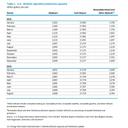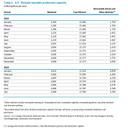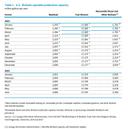Feedstocks
Rep. Max Miller, R-Ohio, on Nov. 7 introduced the bipartisan Farm to Fly Act, which aims to create new markets for U.S. agricultural products and strengthen domestic production of sustainable aviation fuel (SAF).
U.S. biofuels operable production capacity was up slightly in August, with a small gain for ethanol, according to data released by the U.S. EIA on Oct. 31. Feedstock consumption was down slightly from the previous month.
Sen. Jeff Merkley, D-Ore., and five of his colleagues are urging the IRS to ensure that fuels made from petroleum products, specifically plastic feedstocks, are unable to qualify for the IRA’s SAF and clean fuels production tax credits.
The call for presentation abstracts for the 17th Annual International Biomass Conference & Expo, produced by Biomass Magazine, is now open. The event will take place March 4-6, 2024, at the Greater Richmond Convention Center in Richmond, Virginia.
Louis Dreyfus Co. is constructing a soybean processing plant in Ohio, with crushing, vegetable oil refining and lecithin production and packaging capabilities. The plant also provides an option to participate in the biofuel feedstock market.
Yield10 Bioscience Inc. on Oct. 11 announced recent advancements toward enabling weed control for Camelina cultivation and supporting grower adoption of the crop for production of low-carbon intensity feedstock oil for the biofuel market.
The USDA increased its forecast for 2023-’24 soybean oil use in biofuel production in its latest WASDE report, released Oct. 12. The estimate for 2022-’23 soybean oil use in biofuel production was also revised up.
The USDA on Oct. 12 released its latest Crop Production report, predicting that U.S. soybean production will reach 4.1 billion bushels, down 1 percent from last month’s forecast and down 4 percent when compared to 2022.
Global Clean Energy Holdings Inc. on Oct. 4 announced that its subsidiaries Sustainable Oils Inc. and Camelina Company worked with growers to contract a record 65,000 acres of camelina crop during the 2023 growing season.
Yield10 Bioscience Inc. announced that the harvest of a majority of the winter and spring camelina grain produced under grower contracts in 2022/2023 has been completed and the company is generating revenue from feedstock delivery.
Operable biofuels production capacity in the U.S. expanded slightly in July, according to data released by the U.S. Energy Information Administration on Sept. 29. Feedstock consumption was up when compared to both the previous month and July 2022.
The USDA’s National Agricultuiral Statistics Service released its latest quarterly Grain Stocks report on Sept. 29, reporting that old crop soybeans stored in all positions on Sept. 1 were down 2 percent when compared to the same time last year.
ADM and Syngenta Group have signed an MOU to collaborate in scaling research and commercialization of low carbon-intensity next-generation oilseeds and improved varieties to help meet skyrocketing demand for biofuels and sustainably sourced products.
DOE seeks input on building supply chains for SAF
The U.S. DOE has released a RFI to better understand the challenges facing critical elements within SAF supply chains. The agency is specifically seeking input from industry, academia, research laboratories, government agencies, and stakeholders.
Clean Fuels Alliance America, American Soybean Association, National Oilseed Processors Association the U.S. Canola Association are urging the Biden administration to adopt GREET for the purposes measuring GHG reductions for the SAF tax credit.
Montana Renewables LLC, a subsidiary of Calumet Specialty Products Partners LP, on Sept. 18 hosted an event to celebrate the first receipts of camelina oil into its biorefinery in Great Falls, Montana. The facility produces renewable diesel and SAF.
The RFA, Growth Energy and the USGC on Sept. 14 sent a letter to U.S. Treasury Secretary Janet Yellen advocating for the adoption of GREET to measure GHG reductions for the purposes of SAF tax credit created by the Inflation Reduction Act.
The U.S. Department of Energy's Bioenergy Technologies Office awarded $18.6 million in funding to eight university and industry projects to develop biomass feedstocks to produce affordable biofuels and bioproducts that reduce GHG emissions.
Neste is disputing a report filed with the USDA that suggests the company may have received fraudulent used cooking oil (UCO) volumes at its renewable products refinery in Singapore, specifically virgin palm oil from Indonesia.
Members of the European Parliament (MEPs) on Sept. 13 approved a new law that ramps up requirements for sustainable aviation fuel (SAF) within the European Union but sets limits on what types of feedstocks that fuel can be made from.
Clean Fuels outlook predicts growing supplies of used cooking oil
Global used cooking oil (UCO) supplies are anticipated to rise from 3.7 billion gallons in 2022 to between 5 billion and 10 billion gallons by 2030, according to a report released by Clean Fuels Alliance America on Sept. 13.
Agricultural Secretary Tom Vilsack on Sept. 12 called on ethanol producers to seize the opportunity offered by the emerging SAF market and stressed that climate-smart ag and carbon capture technologies must play a role in ethanol-to-SAF production.
The USDA maintained its forecast for 2023-’24 soybean oil use in biofuel production in its latest WASDE report, released Sept. 12. The estimate for 2022-’23 soybean oil use in biofuel production was revised up.
The USDA's National Agricultural Statistics Service predicts soybean production for 2023 will fall to 4.15 billion bushels, down 3 percent from last year, according to the agency's latest Crop Production report, released Sept. 12.
Gevo Inc. has finalized and executed a notice of grant and agreement award with the USDA for a Partnerships for Climate-Smart Commodities grant of up to $30 million for Gevo's Climate-Smart Farm-to-Flight Program.
U.S. operable biofuels capacity was up in June, with gains for both ethanol and renewable diesel and associated fuels, according to data released by the U.S. EIA on Aug. 31. Feedstock consumption was also up during the month.
Idemitsu Kosan, a Japanese petroleum company, and LOPS Corp., a Japan-based trading company that supplies oil and fats, on Aug. 24 announced plans to conduct a joint study focused on the procurement of feedstocks for SAF production.
The Canadian government on Aug. 30 announced it is investing up to $5.3 million in an initiative that aims to support the development of biomass supply chains and cutting-edge technologies to produce biomass and value-added agricultural products.
The U.S. DOE's Bioenergy Technologies Office and the U.S. National Science Foundation have funded three new projects that aim to help accelerate innovation and develop new biomanufacturing approaches.
Minnesota SAF Hub launches collaboration to scale SAF
Through the GREATER MSP Partnership, Bank of America, Delta Air Lines, Ecolab and Xcel Energy have established the Minnesota SAF Hub – the first large-scale SAF Hub in the U.S. committed to scaling SAF production.
Advertisement

































